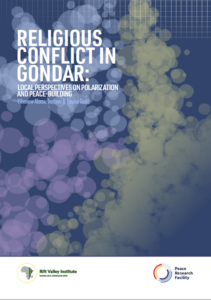SUMMARY
• Gondar city is known for centuries of peaceful coexistence between its Muslim and Orthodox Christian community members. These inter-religious relations have, however, deteriorated over recent decades, erupting into view in the April 2022 attack on Muslim mourners and subsequent inter-communal clashes that prompted demonstrations and counter-reactions in multiple cities across Ethiopia.
• Study participants pointed to a variety of underlying causes for the decline in relations, including inter-religious competition (mainly between Muslims and Christians over land and places of worship), intra-religious divergence, divisive teachings/preaching in churches and mosques, and political interference in religion.
• Gondar’s residents still seem divided over even the bare facts of the April 2022 conflict. Muslim study participants generally described a higher number of casualties than Orthodox participants, and insisted the Piassa mosque had been burned to the ground, which was disputed by Orthodox interviewees. Such divergences show how the conflict continues to shape information politics.
• One frequently shared sentiment is that Ethiopia’s wider politics have proven detrimental to inter-religious relations in Gondar, with the past three decades of ethnolinguistic federalism having amplified ethnic and religious differences. Moreover, while Orthodox Christians often associate the conflict with Muslim intra-religious differences, blaming increasing public tensions on the rise of ‘Wahhabism’, Muslims place the blame on the divisive teachings of Orthodox associations such as Mahibere Kidusan.
• Despite the government being regarded as mostly unhelpful, our study identified four important resources for restoring peaceful inter-religious relations. Firstly, while expectations about the future are mixed, no participant accepted inter-religious conflict as the norm. Secondly, informants lauded indigenous conflict resolution processes, with hope expressed that these could be applied in Gondar city. Thirdly, participants acknowledged the potential for genuine inter-religious peacebuilding forums, run by respected religious leaders and elders rather than imposed by government. Fourthly, government can improve its role more generally when it comes to conflict prevention.
This report was written for the Ethiopia Peace Research Facility (PRF). The PRF is an independent facility combining timely analysis on peace and conflict from Ethiopian experts with support for conflict-sensitive programming in the country. It is managed by the Rift Valley Institute and funded by the UK government.
Find the Amharic version of the report summary here.




